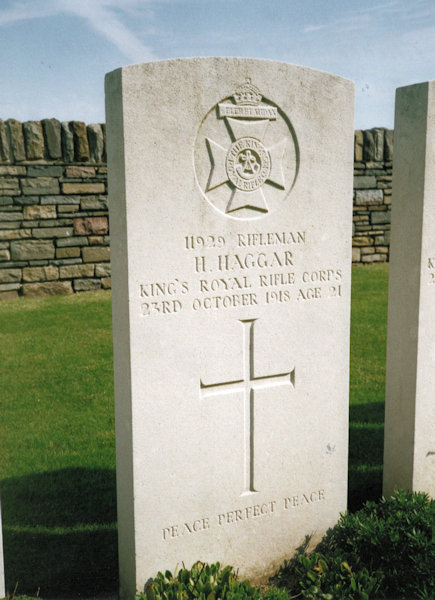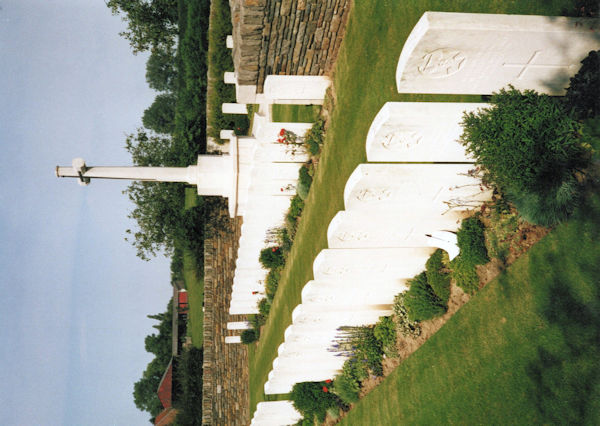Name
Harry Haggar
Conflict
First World War
Date of Death / Age
23/10/1918
21
Rank, Service Number & Service Details
Rifleman
11929
King's Royal Rifle Corps
13th Bn.
Awards: Service Medals/Honour Awards
1914 /15 Star, British War and Victory medals
Cemetery/Memorial: Name/Reference/Country
BEAURAIN BRITISH CEMETERY
C. 8.
France
Headstone Inscription
Peace perfect peace
UK & Other Memorials
Hitchin Town Memorial,
St Mary's Church Roll of Honour, Hitchin
Pre War
Wartime Service
The information given below is mostly taken from his service records, but it should be noted that sometimes the writing is very faint, even on pages where some is very dark. In some cases it looks as though some parts have been overwritten to make them clearer and perhaps errors have crept in?
Harry was given the number 11929 and posted to the Kings Royal Rifle Corps for training on the 21 August 1914. The summary of his service, as best it can be read, is:
Home Service 21/8/1914 to 28/11/1914
BEF 29/11/1914 to 11/4/1915
Home Service 12/4/1915 to 3/8/1915
BEF (France) 4/8/1915 to 21/8/1916
Home 22/8/1916 to 21/4/1917
The next line is unreadable, but by default must read:
BEF France 22/4/1917 to 23/10/1918
As he enlisted on 21 August 1914, leaving to go to France on 28/11/1914 was unusual for men without previous service, and Harry had not served. Six months training was the usual minimum length of training.
As can be seen in the information below, he was certainly wounded once, perhaps twice, and his service was not without blemish. He went through periods of difficulty with discipline, but of course the charge sheets only give one side of the story. Perhaps some of this was the result of too little training.
His service record shows that he was hospitalised in Bethune on 24 March 1915 with pleurisy and was returned to the UK on 12 April 1915, and was therefore absent from the front line. While in the UK he was posted on 12 June 1915, possibly to the 5th Battalion. On 22 July 1915 the note appears to read ‘Whilst on active service absent off pass from Tattoo 19.7.15 until 11p.m. 20.7.1915’ the punishment given is too difficult to make out.
He was sent back to France on 3 August 1915, and on the following day, in France, he was posted to 7 Dept(?) and then joined his battalion on the 6th.
On 22 September 1915 at Ypres (Belgium) he was given 7-days confined to barracks for ‘Falling out on the line of march without permission’ and from then his discipline appears to have got worse:
7/2/1916 - ‘Hesitating to obey an order’ - 10-days’ confined to barracks.
17/2/1916 - ‘Absent from defaulters drill at 4:30pm’ - 3-days’ confined to barracks.
19/2/1916 - ‘Being unwashed on parade’ - 3-days’ confined to barracks.
25/3/1916 - ‘Losing by neglect a pair of wire cutters’ (in the field) – loss of 3-days’ pay.
1/4/1916 - ‘Disobeying orders and not wearing his boots in the support trench’. - 5-days’ confined to barracks.
There are several notes which may refer to the same incident; one dated 30 May 1916 suggest that received 5-day’s confined to camp for ‘malingering on parade’ and another for 31 May 1916 he lost another 3-day’s pay because he was ‘Absent from defaulters drill 2pm to 5pm’ 3-days confined to barracks and loss of 3-days’ pay.
22 July 1916 he was given 14 days Field Punishment No. 1 for 1) refusal to obey orders and 2) insolence to an N.C.O. This punishment usually consisted of the convicted man being placed in fetters and handcuffs or similar restraints and attached to a fixed object, such as a gun wheel or a fence post, for up to two hours per day. These offences must have been away from the Front line otherwise he may have been dealt with more seriously.
He received a severe gun shot wound to the jaw on 18 August 1916 and was first sent to 45 Casualty Clearing Station and then sent back to England where he remained until 21 April 1917, when he left for France. One note says that that the wound was to both cheeks, and a later note, April 1917, suggests that he artificial dentures supplied. Although is does not state that these were related to his injury and there is an updated note referring to abstracted decaying teeth.
While he was at home he was granted furlough between 26 September and 5 October, during which he returned to Hitchin. He was posted to the 5th Battalion on 6 October 1916, then to the 6th Battalion on the 28th. He returned to Franc on the 22 April 1917 and was immediately posted to the 11th Battalion. and then finally to the 13th on 7 May 1917. In which he remained until his death
During the period from in he was in the 13th, they were involved in the following actions (courtesy of www.krrassociation.com)
Bucquoy, 21st August. In this attack the 13th Battalion, 37th Division, took part on 21st August. All objectives were taken rapidly and the Naval Division and cavalry passed through.
23rd to 26th August. On the 23rd the 13th Battalion was again in action and their Commanding Officer, Lieutenant-Colonel A. N. Strode Jackson, D.S.O., was wounded. On the 24th they again advanced, but their objective, the village of Favreuil, was not captured until the 26th.
13th Bn. Trescault, 11th and 12th September. The 13th Battalion in the 37th Division, Fourth Army, were in action on 11th and 12th September in the capture of Trescault village. Hand-to-hand fighting took place and on the following day the Germans counter-attacked unsuccessfully, leaving many dead. The Battalion was withdrawn on the 16th. Losses: Officers: killed 2, wounded 6; other ranks: 40.
13th Bn. Belaise, 8th October. The 13th Battalion attacked successfully north of Belaise. All objectives were taken and the Battalion captured 300 prisoners.
On the date of Harry’s death they were at Briastre, ready to attack, and part of a much wider attack intended to take the villages of Neuville and Salesches and the high ground of that area. The Germans launched a 30 minute barrage at 01:30 and then at 02:00am – the zero hour of the British attack, our guns opened up and the attack proceeded behind a creeping barrage. By 15:45 reports were being received suggesting that despite some difficulty the attack was successful and had reached Neuville. Casualties in Harry’s battalion were reported as light “considering the nature of the country advanced over” and were estimated as 6 officers and 72 other ranks. They had captured 2 German officers and 40 other ranks, 14 machine guns and 2 field guns. They also reported that they had liberated 22 French civilians from the village who had been hiding in cellars. The attack was part of the Battle of the Selle. This was a day of massive attacks during which the 37th Division seized Ghissignes and its bridge in the area of Le Quesnoy.
Harry met his death in this attack. His Chaplain wrote: "Rifleman Hagger was in a party who were advancing when an enemy machine gun opened fire on them, killing several, Rifle Hagger was shot through the heart." he added "His passing is a source of great sorrow to his comrades and officers. From r=the Colonel downwards, all speak of the splendid work which he has repeatedly done out here."
He was buried in Row C, Grave 8 in the Beaurain British Cemetery in France. A private inscription on the stone reads "Peace perfect peace".
Additional Information
Acknowledgments
Adrian Dunne, David C Baines, Jonty Wild



